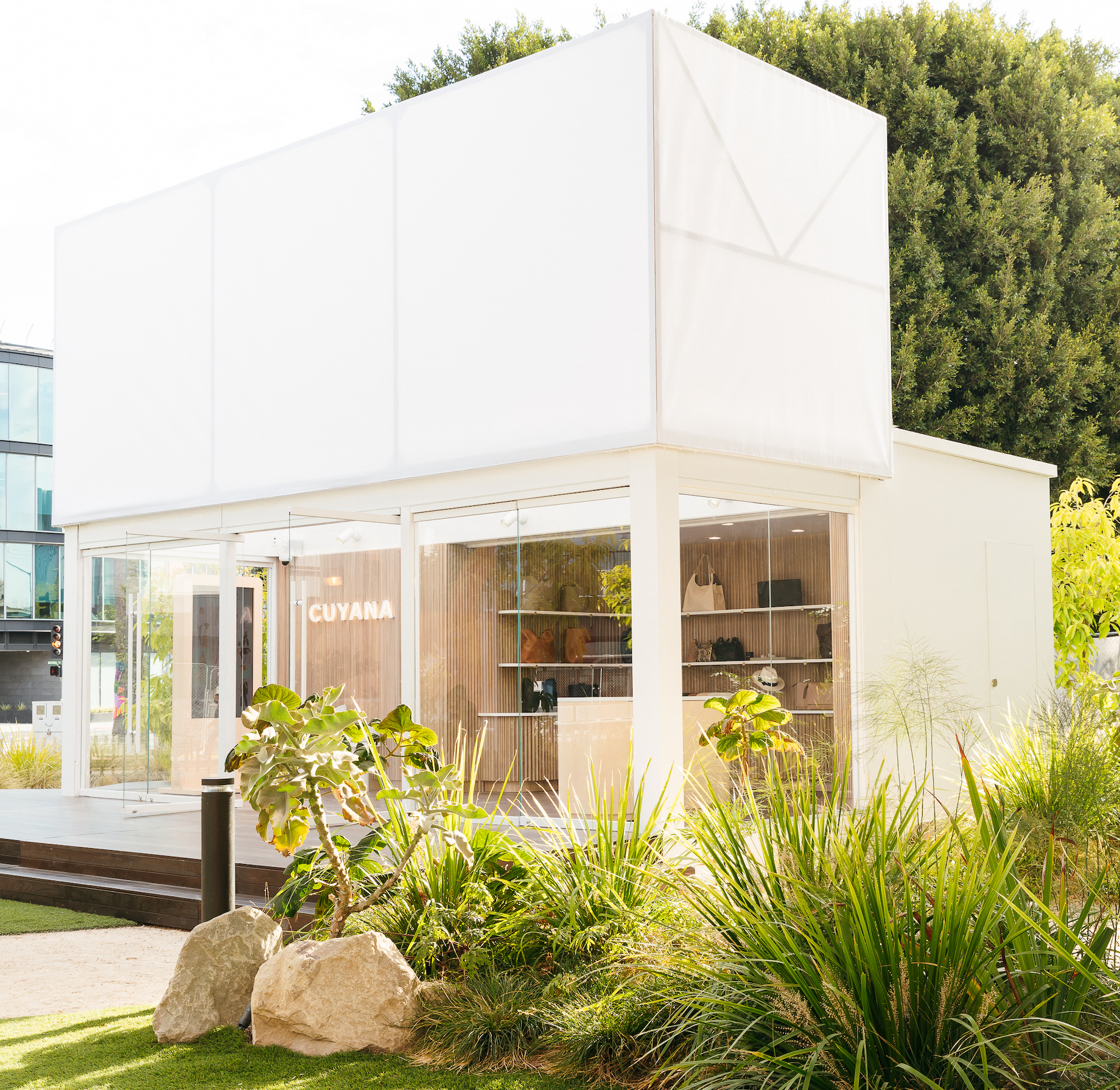Toyota is testing a modular, mobile store concept designed to help retailers quickly set up temporary showrooms in parking lots and other underused sections of shopping centers. If successful, the automaker eventually could operate a fleet of mobile stores that enable retailers to test markets on flexible terms while helping landlords monetize ancillary spaces.
A prototype, dubbed Toyota Agile Space, opened this month as a showroom for Cuyana, a digitally native seller of women's apparel and accessories. It sits in a park area within Platform, a mixed-use development with 50,000 square feet of retail in Culver City, California. The store features a 350-square-foot showroom and 600 square feet of exterior deck space. Toyota transported the structure by truck and assembled it in about three days.

Photo credits: Monica Wang
"Both retailers and landlords are looking for an alternative retail model which is not pop-ups and not bricks-and-mortar," Toyota researcher Baik Hoh told SCT. "If we can quickly turn an underused parking lot into a usable retail space, then that could be a win-win story for both landlords and retailers." Hoh is principal researcher of the Intelligent Mobility Systems unit at Toyota InfoTech Labs, a Mountain View, California-based division of Toyota Motor North America Research and Development. His team works to solve societal problems using Toyota's expertise in mobility, space optimization and just-in-time production.
Toyota Agile Space is aimed at making the retail sector more dynamically responsive, enabling retailers to enter more venues and test out locations without committing to long-term leases. Landlords could use mobile stores to experiment with more brands and service options to increase foot traffic, the researchers contend. Cuyana co-founder Shilpa Shah views her company’s upcoming tour in Toyota Agile Spaces as an opportunity to find innovative solutions as the retail industry shifts and consumer behaviors continue to evolve. "At Cuyana, we’ve always believed in retail and are eager to develop innovative approaches to efficiently test and learn from what will resonate the most with today’s consumer," Shah said in a written statement provided by Toyota.
The first tenant’s tour
Toyota selected Cuyana for its pilot from a pool of 50 brands due largely to the retailer's willingness to adapt its market growth strategy to the Toyota Agile Space initiative, Hoh said. "They have a strong online presence and marketing, so they can create the online sales," he said. "Their interest was how to acquire new customers."
The traveling Cuyana showroom will operate in five shopping centers across Los Angeles and Orange counties before ending its tour in December. Locations reflect the retailer's co-tenancy preferences, as well as Toyota’s desire to test a variety of spaces ranging from curbsides to parking lots and from parks to courtyards. At each site, the InfoTech Labs team will monitor the showroom's foot traffic, visit duration and other key performance indicators, Hoh said, including transaction data to create heat maps of Cuyana's growing customer base.
Cuyana customers will be able to see and handle products in the showroom, talk with sales associates and order products using the company’s apps for delivery, but size limitations preclude keeping inventory at the store. A retailer that needs space for onsite inventory could attach a second modular unit to the showroom, Hoh said.
Ultimately, the InfoTech Labs team hopes the Toyota Agile Space platform might serve in applications beyond the retail sector, such as municipal services, childcare, offices and health care. Possibilities include a platform to connect landlords and retailers for short-term occupancy using mobile showrooms that Toyota would deliver and assemble. Alternatively, the manufacturer could acquire underused spaces for the mobile structures and lease them directly to occupiers.
First, the research team wants to see if its flexible concept can serve as an alternative to conventional retail space in helping digitally native brands reach new geographic markets. They also hope the pilot will show whether the product can help landlords repurpose underused space and stimulate foot traffic.
"We are at the stage of checking the early traction from potential retail and landlord customers," Hoh said.
By Matt Hudgins
Contributor, Commerce + Communities Today